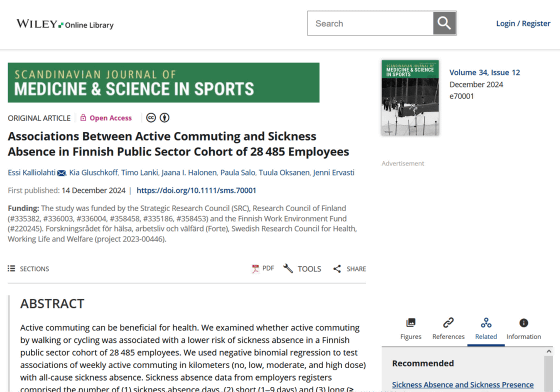People who commute by bicycle take fewer sick days off work, study finds

Some people who commute to work may choose to cycle to work for health or environmental reasons, and a new study of more than 28,000 workers has found that people who cycle to work are less likely to miss work due to illness compared to those who drive or take public transport.
Associations Between Active Commuting and Sickness Absence in Finnish Public Sector Cohort of 28 485 Employees - Kalliolahti - 2024 - Scandinavian Journal of Medicine & Science in Sports - Wiley Online Library

Study confirms the benefits of commuting by bicycle in particular in reducing sickness absences | Finnish Institute of Occupational Health
https://www.ttl.fi/en/topical/press-release/study-confirms-the-benefits-of-commuting-by-bicycle-in-particular-in-reducing-sickness-absences
People Who Cycle to Work Take Fewer Sick Days. But Why? : ScienceAlert
https://www.sciencealert.com/people-who-cycle-to-work-take-fewer-sick-days-but-why
Most people know that moderate exercise is necessary for good health, but finding time to exercise is a challenge for workers who work every day. As a result, more and more people are trying to overcome lack of exercise by switching their daily commute from public transportation or car to walking or cycling.
In a new study, a team from the Finnish Institute of Occupational Health investigated whether walking or cycling to work was associated with a lower risk of sickness absence. 'There is already research evidence on the health and environmental benefits of active commuting by walking or cycling. However, the association between active commuting and the risk of long-term sickness absence, for example, has never been investigated before,' said Essi Kalliolahti, a postdoctoral researcher at the Finnish Institute of Occupational Health and the University of Eastern Finland and lead author of the study.
The study analysed data collected from 28,485 local government workers in Finland who were followed for one or two years, including commute method, distance and number of days absent due to illness.
The analysis found that workers who walk or cycle to work miss fewer days due to illness compared to workers who commute by car or public transport. In the graph below, the vertical axis shows the number of days of sick leave taken by 100 workers in a year, and the horizontal axis shows the amount of physical activity during commuting. The graph on the left is based on data from a 12-month period, while the graph on the right is based on data from a 24-day period. Comparing the graphs, we can see that workers who exercise more on their commute tend to miss fewer days of sick leave.

The most active group walked or cycled more than 30km to work per week, averaging 61km, with the average commute distance for these people being 9.4km one way. Compared to the least active group, people in this group were reported to have an 8-12% lower risk of taking sick leave, and an 18% lower risk of taking long-term sick leave of 10 days or more.
'The study also found that when walking and cycling commuters were compared separately, the association between commute distance and number of sick days was only observed in the most physically active cycling commuters. The research team speculates that walking commuters may be doing less exercise per week or at a lower intensity.
The research team also took into account other potential factors that may influence illness statistics, such as gender, age, alcohol consumption and socioeconomic status, but it's important to note that this study only shows an association between commuting and sickness absence, not a direct causal relationship.
'Our findings provide an additional reason to encourage and invest in active commuting, especially cycling,' said Jenni Ervasti, co-author of the paper and lead researcher at the Finnish Institute of Occupational Health.

Related Posts:







